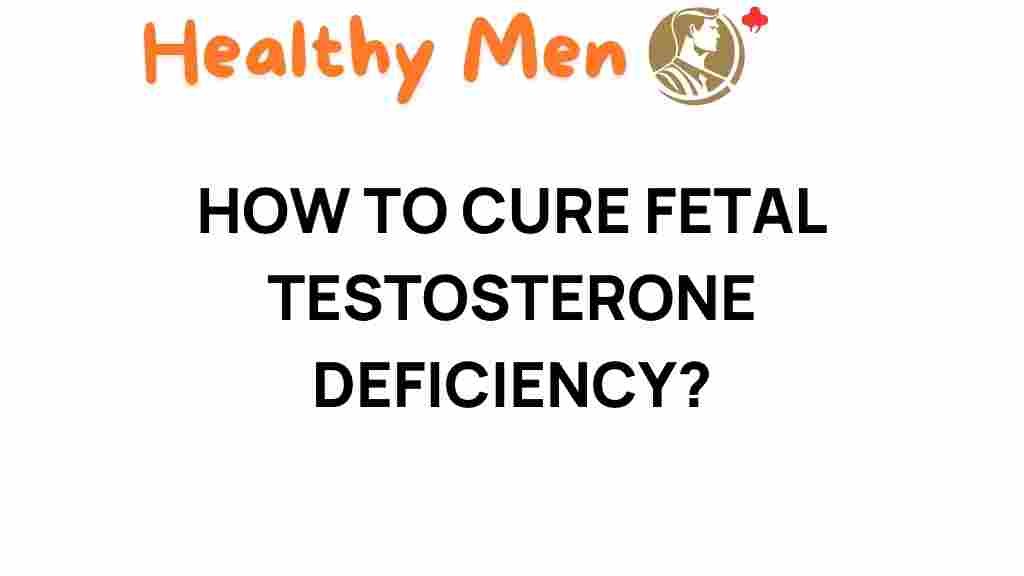Unraveling the Mystery of Fetal Testosterone Deficiency
Fetal testosterone deficiency is a condition that has garnered increasing attention in the realm of prenatal health. As a critical hormone in fetal development, testosterone plays a significant role in shaping not only physical characteristics but also neurological development. Understanding and addressing fetal testosterone deficiency is essential for ensuring optimal maternal health and fetal well-being. This article will explore the complexities of fetal testosterone deficiency, its implications for hormone imbalance, and potential solutions through testosterone therapy and other interventions.
Understanding Fetal Testosterone Deficiency
Fetal testosterone deficiency refers to an insufficient level of testosterone during critical periods of fetal development. This deficiency can arise due to various factors, including maternal health issues, endocrine disorders, or genetic predispositions. The implications of low testosterone levels in the fetus can include:
- Impaired sexual differentiation
- Neurological development issues
- Increased risk of congenital conditions
Recognizing the symptoms and implications of fetal testosterone deficiency is vital for both expectant mothers and healthcare providers. Early diagnosis and intervention can lead to better outcomes for both the mother and child.
The Role of Testosterone in Fetal Development
Testosterone is not just a male hormone; it plays a crucial role in fetal development for all genders. During the early stages of pregnancy, testosterone influences:
- Sexual differentiation: Testosterone is key in developing male anatomical features and affects the development of the brain associated with gender identity.
- Bone growth: Testosterone contributes to skeletal development, influencing birth weight and overall fetal growth.
- Neurological function: Optimal levels of testosterone are linked to cognitive abilities and social behaviors.
Therefore, a deficiency during critical developmental windows may lead to significant long-term effects on the child’s health and future development.
Causes of Fetal Testosterone Deficiency
Identifying the causes of fetal testosterone deficiency is crucial for prevention and management. Some common causes include:
- Maternal hormone imbalance: Women with hormonal disorders may experience fluctuations that affect fetal hormone levels.
- Endocrine disorders: Conditions like polycystic ovary syndrome (PCOS) can disrupt normal hormonal balance during pregnancy.
- Genetic factors: Certain genetic conditions may predispose the fetus to lower testosterone production.
- Environmental factors: Exposure to endocrine disruptors, such as certain chemicals and pollutants, can affect hormone levels.
Understanding these causes can help in planning appropriate prenatal care and monitoring.
Testing for Fetal Testosterone Deficiency
Testing for fetal testosterone deficiency is not routine but can be conducted in specific cases where there is a concern. Healthcare providers may recommend:
- Blood tests: Maternal blood tests can provide insights into hormonal levels.
- Ultrasound imaging: Certain ultrasound markers may suggest hormonal imbalances that warrant further investigation.
- Amniocentesis: In some cases, analyzing amniotic fluid can provide data on fetal hormone levels.
It is crucial to discuss any concerns about fetal testosterone deficiency with a healthcare provider to determine the best testing approach.
Solutions and Treatments for Fetal Testosterone Deficiency
If fetal testosterone deficiency is diagnosed, several strategies might be employed to mitigate its effects. These solutions can include:
- Testosterone therapy: Administering testosterone to the mother under strict medical supervision may help normalize fetal levels.
- Dietary adjustments: A balanced diet rich in nutrients, vitamins, and minerals can support hormonal health. Foods that promote hormonal balance include:
- Healthy fats (avocados, nuts, olive oil)
- Lean proteins (fish, poultry)
- Fruits and vegetables (leafy greens, berries)
- Stress management: Techniques such as yoga, meditation, and deep-breathing exercises can help manage stress, which is essential for maintaining hormonal balance.
- Regular prenatal care: Routine check-ups with a healthcare provider can help monitor both maternal and fetal health.
By implementing these strategies, expectant mothers can promote better prenatal health and potentially improve outcomes related to fetal testosterone deficiency.
Potential Complications of Untreated Testosterone Deficiency
Neglecting fetal testosterone deficiency can lead to various complications, including:
- Congenital anomalies
- Behavioral issues in childhood
- Infertility issues later in life
- Increased risk of certain health conditions
It’s essential for mothers to stay informed and proactive about their health and their baby’s development.
Maintaining Maternal Health for Fetal Well-Being
To mitigate the risks of fetal testosterone deficiency, maintaining maternal health is paramount. Here are some practical tips:
- Regular exercise: Engaging in moderate physical activity can help regulate hormones.
- Stay hydrated: Adequate water intake is essential for overall health and hormone regulation.
- Avoid harmful substances: Steering clear of tobacco, alcohol, and drugs can significantly improve pregnancy outcomes.
- Get enough sleep: Prioritize rest to support hormonal health and overall well-being.
By focusing on maternal health, mothers can create a more favorable environment for fetal development.
Conclusion: Embracing Solutions for Fetal Testosterone Deficiency
Fetal testosterone deficiency is a complex issue that requires careful consideration and proactive management. By understanding the role of testosterone in fetal development and recognizing the potential implications of deficiency, expectant mothers and healthcare providers can work together to promote better outcomes.
Through a combination of testosterone therapy, proper nutrition, stress management, and regular prenatal care, it is possible to address and mitigate the challenges associated with fetal testosterone deficiency. By prioritizing both maternal health and fetal development, we can pave the way for healthier generations to come.
For more resources on pregnancy wellness and hormone balance, consider exploring this informative article. Remember, staying informed and proactive is key to achieving optimal prenatal health.
For further reading on endocrine disorders and their impact on pregnancy, visit this external link for comprehensive insights.
This article is in the category Conditions and created by healthymen Team
